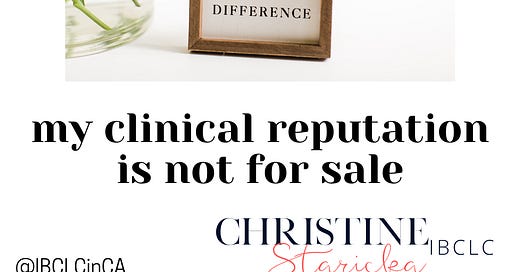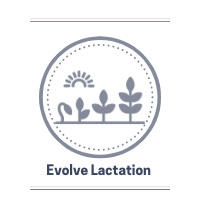Practice Philosophy and Product Endorsement
In reply to your email or direct message, no thank you.
I decided a long time ago that I don’t do that.
I won’t review your product.
I won’t accept your free samples for my clients to try out.
In my social media posts, I won’t post that any one type of device/tool/product is “the” best one for breastfeeding.
I won’t show photos during my speaking engagements or on social media or my website that depict a brand or logo of a product that impacts lactation.
I won’t participate in giveaways or baskets or anything that involves products pertaining to lactation or feeding babies.
I am a professional health care provider.
I am trained and qualified to offer education, counseling, and clinical assistance with human lactation.
In the course of that work, I also need to have objective information about products that may be appropriate for my clients should they face a specific issue or need.
It is my responsibility to acquire that information on my own.
Like all of the other information I have obtained over my career about human physiology, the biology of lactation and infant development and all other areas of knowledge required of me, it is my responsibility to obtain information about products in an ethical way that does not expose me to commercial influence.
If that means I have to buy a product to hold it my hands and see how it works, I have to do that.
If it means I have to invest my time in meeting with my colleagues in spaces where we can discuss how products are working in the real world and what we’ve learned, I have to do that.
If it means I have to read the marketing materials, product specs, and other information provided by the product’s manufacturer so that I can also consider that in my whole body of knowledge about lactation, I have to do that.
If that means I have to research (separately from the manufacturer’s claims) the things they are saying to determine whether it fits with current scientific understanding of the process of human lactation, I have to do that.
It’s my responsibility to my clients.
This element of my Personal Practice Philosophy was established early in my lactation career.
Fortunately for me, I had a mentor who clearly explained to me the risks of health care providers endorsing brands and products and how that can impair professional judgment, leading to poor and unintended client outcomes.
It makes it very simple for me to avoid wasting time considering collaborations, endorsements, brand partnerships, and other opportunities involving any product that potentially impacts human lactation.
I don’t do it, so I don’t have to think about it.
If someone asks me why, I am happy to make the time to explain it.
No matter how great a product might be, I have no control over it.
What if I stake my reputation on it and the company turns out to be super shady?
What if they don’t have a solid business plan, go under, and now my clients can’t get the thing I told them they have to have for breastfeeding?
What if they stop investing as much in quality ingredients or components and the quality of the product begins to decrease?
How will I explain those things to my tearful client who is having poor outcomes because the thing doesn’t work as promised?
I hear the argument that as a small business owner, non-profit organization, or other cash-strapped entity, product partnerships and endorsements are part of the income stream.
Nope.
That’s not an excuse.
Making money off an unethical practice just because you need the money isn’t a valid rationale.
It isn’t fair to your clientele to use them as guinea pigs to try out products for the benefit of a product manufacturer, and it isn’t clinically appropriate to say that any one product is the ideal one for everyone.
Every client deserves individual assessment and evaluation of their unique needs, supplemented only when clinically appropriate by information about products, devices, or tools which might be effective in their situation.
There are plenty of other potential income streams that can be part of your overall business plan.
In fact, there are products and services that I DO endorse and promote.
They have nothing to do with human lactation or feeding babies.
I have a separate list of conditions for that, but the main one is that it’s something that is not related to the practice of clinical lactation education and care.
Social media posts that say or imply that any one brand or type of product is the “best” one are clinically inappropriate.
And if the product, device, or tool is of questionable value to lactation in general, they shouldn’t be part of the conversation. No one needs their lactation journey to be more confusing, costly, or challenging than it already is.
I hear the argument that these types of posts are very valuable for engaging your audience on social media and getting the attention of your potential clients.
There are plenty of other ways to educate and market to your audience of potential clients on social media.
Using social media to educate the public about breastfeeding is a strategy which is highly valuable to society when done right.
Using it for marketing your lactation or birth care practice is also a high-value tactic with high potential for positive outcomes in terms of attracting clients and building community wherever you are in the world.
But it has to be done appropriately.
The information shared should be general in nature, applying to most people. It should elevate the practice of breastfeeding and focus on the message that many people benefit from personalized education and one-to-one consultation. particularly if they are struggling.
Social media messages can still be funny, touching, emotional, supportive, and inclusive without endorsing, mentioning, or showing brands and logos.
It’s completely possible to build business using social media without involving brand names or partnerships.
Plenty of individuals and organizations have done it.
I hope this simplifies some things for you.
If you’ve got more questions about this, please reach out. This is an important consideration when determining what you do and what you don’t do in your lactation practice, so I’m happy to be there for you as you figure out how to navigate it in the real world!
You can always hit Reply to these emails to let me know what you’re thinking.








Christine, this is an amazing post! I, too, am inundated with requests to trial this or that device, product, or service and have searched for a way to say no with an explanation for why. Your post does it SO well and I will craft my own based on yours. THANKS so much!!
Kathy Parkes, RN, IBCLC, FILCA